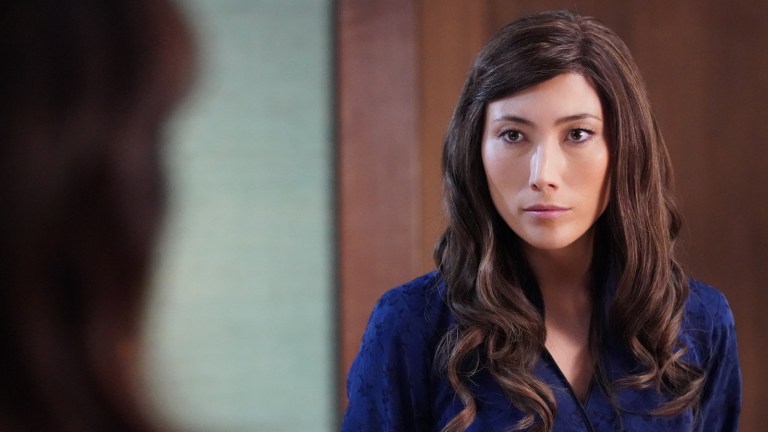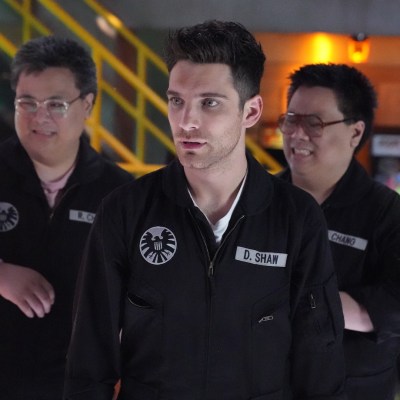Agents of SHIELD Season 7: Jiaying’s Other Daughter Kora
When Agents of SHIELD revisited Afterlife, fans were surprised to see that Daisy wasn’t Jiaying’s only daughter — but who is Kora?

This article contains Agents of SHIELD spoilers.
One of the main mysteries in the first season of Agents of SHIELD was the identity of Daisy Johnson’s parents, only back then Chloe Bennet’s character was known as Skye. Eventually, the show introduced us to her father Cal who led her to her mother Jiaying and the transformative Terrigenesis process that gave Quake her powers. With the Inhuman storylines that followed, Daisy’s journey remained at the heart of the series for several seasons. So how did we not know that she had a sister named Kora?
In the season 7 episode, “After, Before,” the team visits 1983 as part of its jaunt through SHIELD history, and Agents May and Rodriguez revisit Afterlife, the hidden community of Inhumans overseen by the ageless Jiaying that Agents of SHIELD explored five seasons ago. Being nearly a decade before Daisy’s birth, their main concern seems to be doing something that could prevent Agent Johnson from existing in this timeline. Additionally, they’re hoping that since they’ve arrived before Jiaying was torn to pieces and the infant Daisy kidnapped by Hydra, a traumatic event that turned careful privacy into violent mistrust, the leader of Afterlife will be more amenable to helping them.
The uncertainty about Jiaying’s state of mind makes their first encounter with Kora understandably worrisome. The young woman appears to be a prisoner in Afterlife, and she warns the agents that they should not have come. However, the drama of the Agents of SHIELD episode centered around two surprises. The first was that, although the knife-wielding Lee was harsh in his recommendations for containing Kora, her powers were explosive and out of control, presenting a danger to the other residents of the community. The second, of course, was that Jiaying was Kora’s mother who was trying to help her daughter cope with newfound powers, a process not unusual for Inhumans who have recently undergone Terrigenesis.
It probably goes without saying that Kora would be Daisy’s half-sister since Dr. Calvin Johnson won’t meet Jiaying until 1990-ish when he arrives in China with the Doctors Without Borders program. It’s possible that Kora’s father is from Afterlife, but since no such mention was made, it’s equally likely that he is no longer in the picture. Whatever the case may be, Kora’s childhood was likely spent in seclusion, and when Jiaying mentions reading bedtime stories with the preface, “Some stories have witches and dragons and bad men, and I will always protect you from all of it,” Kora rejects the idea, saying that instead her mother protected the world from her.
So if Nathaniel Malick had not changed history by appearing on the scene just before Kora killed herself, would this have been a tragic footnote in Jiaying’s troubled family history? Perhaps the Inhuman leader became more protective of the Terrigenesis process directly because of the death of Daisy’s older sister in 1983, which proved that some were not ready for the instability of the transformation. A large part of the controversy of Agents of SHIELD season two centered around who decides who gets powers and who doesn’t, so this motivation for Jiaying’s tight control would make sense, as would her decision not to mention a lost daughter to either Cal or Daisy.
Whether we’re headed towards a sister showdown is up for speculation, but for the time being, Daisy doesn’t even know what May and Yoyo have discovered. Nathaniel Malick may be assembling an Inhuman army, and Kora’s disillusionment could definitely pit her against SHIELD eventually, perhaps leading to tragedy or redemption, either of which would make for good drama. Kora’s continued existence, however, could also place Jiaying’s future motherhood in jeopardy whether Cal falls in love with her in a few year’s time or not. But as elsewhere in the MCU, changes to history are not uncommon in Agents of SHIELD, and all we can hope for is that the larger family will not tear the existing one apart.

